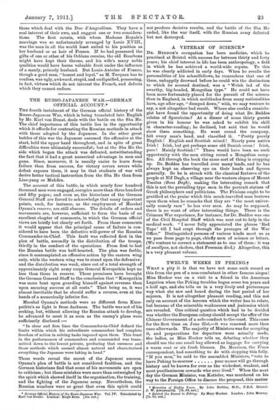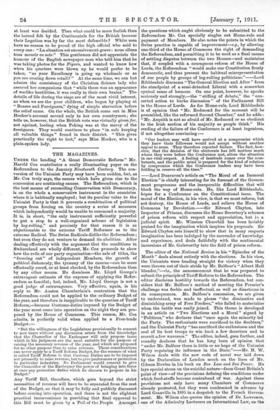TWELVE WEEKS IN PEKING.t
WHIT a pity it is that we have not some such record as this from the pen of a non-combatant in other famous sieges! Miss Hooker was on a visit to a friend in the American Legation when the Peking troubles began some ten years and a half ago, and she tells us in a very lively and picturesque way what she saw and heard during the last period of her sojourn. It is not altogether pleasant reading, and this not only on account of the horrors which the writer has to relate, but because of the miserable weaknesses and jealousies which are revealed. One critical question which had to be decided was whether the European colony should accept the offer of the Chinese Government of a safe-conduct to the coast. This came for the first time on June 2/4,—it was renewed more than once afterwards. The majority of Ministers was for accepting it, and preparations for departure were actually made, the ladies, as Miss Hooker tells us, debating whether they should use the one small bag allowed as luggage for carrying a warm coat or six fresh blouses. Dr. Morrison, the Times correspondent, had something to do with stopping this folly. "If you men," he said to the assembled Ministers, "vote to leave Peking to-morrow your names will go through history and be known for ever as the wickedest, weakest, and most pusillanimous cowards who ever lived." When the next day the German Minister, von Ketteler, was murdered on his way to the Foreign Office to discuss the proposal, this matter " Memories of Bighty Years. By John Beddoe, N.D., FILE. Bristol: J. W. AxrgIvszaith. Cis. 6d. net.] t Behind the Scenes in fekinF. )3y Map, 3:Looker. London : J'obn Murray. gs. 6d. net.]
at least was decided. Then what could be more foolish than the hatred felt by the Continentals for the British because their Legation was .by far the most defensible P White men have no reason to be proud of the high official who said to every one : "La aituation est excessivement grave : nous allons tous mourir ce soir." This gentleman did not appreciate the humour of the English newspaper man who told him that he was taking photos for the Figaro, and wanted to know how when his quarters were blown up he would prefer to be taken, "as your Excellency is going up wholesale or as you are coming down retail?" At the same time, we can but admire the consistency of the Christian Science lady who assured her companions that "while there was an appearance of warlike hostilities, it was really in their own brains." The details of life during the siege are of the most vivid interest, is when we see the poor children, who began by playing at "Boxers and Foreigners," dying of simple starvation before the relief came. On the whole, the British come out in Miss Hooker's account second only to her own countrymen; she tells us, however, that the British vote was virtually given for, not against, looting • when Peking was at the mercy of the foreigners. They would continue to place "in safe keeping all valuable things" found in their district. "This gives practically the right to loot," Bays Miss Hooker, who is a plain-spoken lady.



















































 Previous page
Previous page